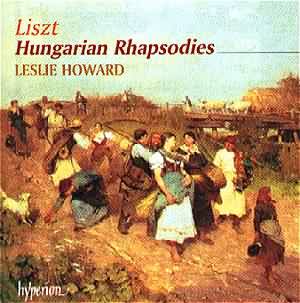
Perhaps this album will be more of a remembrance of the conclusion of this
mammoth liszt piano music series than a colourful alternative for the Rhapsodies
per se. I am happy to state that it fulfills both credentials admirably,
indeed the sense of elation and triumph is palpably present throughout the
whole interpretations. As usual, the detailed notes make for some fascinating
reading and Hyperion have also graciously included a beautifully presented
catalogue to the whole series as an addendum. Howard's speeds in the First
are occasionally too ponderous but the warmth and eloquence of the music
are indeed well served. The Second and Fourth are altogether more familiar
with their distinctive Hungarian rhythms and dashing flair. My particular
favorite from the first nine is the funereal Fifth, perhaps as I was deeply
acquainted to the theme in my youthful days reminding me of obituaries on
the radio! Another wonderfully descriptive work is the Ninth, 'Carnival
of Pest', a joyous raucous piece full of rumbustious good humour and
dazzling piano fireworks. There are also finely honed interpretations of
the Sixth, Seventh and Eighth Rhapsodies, which although not as distinct
as the more famous ones, retain a certain sense of colourful imagery.
The second disc is altogether more obscure at least to this listener. I had
already fished out a copy of Roberto Szidon's efforts on Philips to make
comparisons but was absolutely stunned by the unnerving facility, which Howard
brings to these demanding works. I greatly enjoyed his wonderful versions
of the Twelfth and Thirteenth Rhapsody which are fairly brimful with pianistic
beauty and amazing fireworks. Howard also finds room for the second version
of the Sixteenth; the earlier version has appeared before on a previous
installment to this cycle. Much pomp and circumstance is found in the final
Nineteenth Rhapsody, the ubiquitous 'Csardas nobles' de Kornel Abranyi,
a wonderful work that proves to be a just and rewarding conclusion to this
collection. The shorter Seventeenth and Eighteenth make for some interesting
makeweights and their brevity does not compromise the spirit that lies behind
their inspiration. Wonderful stuff then and all the more impressive in a
suitably impressive Hyperion recording that boasts glamour and a full piano
range. Howard's gracious statements thanking all involved in this unique
project is sentimental to read and reminds us of the greatness and oneness
of this enterprise which will surely be remembered as one of the great classics
of our recorded history. It is a testament to the gigantic output of this
great composer and also a tribute to the exceptional pianism and scholarly
capabilities of one Leslie Howard.
Reviewer
Gerald Fenech
Performance:

Sound:


